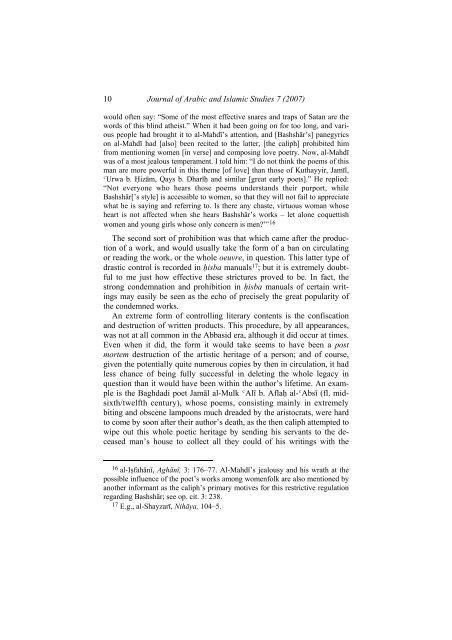Freedom of Expression and Censorship in Medieval Arabic Literature
Freedom of Expression and Censorship in Medieval Arabic Literature
Freedom of Expression and Censorship in Medieval Arabic Literature
Create successful ePaper yourself
Turn your PDF publications into a flip-book with our unique Google optimized e-Paper software.
10<br />
Journal <strong>of</strong> <strong>Arabic</strong> <strong>and</strong> Islamic Studies 7 (2007)<br />
would <strong>of</strong>ten say: “Some <strong>of</strong> the most effective snares <strong>and</strong> traps <strong>of</strong> Satan are the<br />
words <strong>of</strong> this bl<strong>in</strong>d atheist.” When it had been go<strong>in</strong>g on for too long, <strong>and</strong> various<br />
people had brought it to al-Mahdī’s attention, <strong>and</strong> [Bashshār’s] panegyrics<br />
on al-Mahdī had [also] been recited to the latter, [the caliph] prohibited him<br />
from mention<strong>in</strong>g women [<strong>in</strong> verse] <strong>and</strong> compos<strong>in</strong>g love poetry. Now, al-Mahdī<br />
was <strong>of</strong> a most jealous temperament. I told him: “I do not th<strong>in</strong>k the poems <strong>of</strong> this<br />
man are more powerful <strong>in</strong> this theme [<strong>of</strong> love] than those <strong>of</strong> Kuthayyir, Jamīl,<br />
ʿUrwa b. Ḥizām, Qays b. Dharīḥ <strong>and</strong> similar [great early poets].” He replied:<br />
“Not everyone who hears those poems underst<strong>and</strong>s their purport, while<br />
Bashshār[’s style] is accessible to women, so that they will not fail to appreciate<br />
what he is say<strong>in</strong>g <strong>and</strong> referr<strong>in</strong>g to. Is there any chaste, virtuous woman whose<br />
heart is not affected when she hears Bashshār’s works – let alone coquettish<br />
women <strong>and</strong> young girls whose only concern is men?”’ 16<br />
The second sort <strong>of</strong> prohibition was that which came after the production<br />
<strong>of</strong> a work, <strong>and</strong> would usually take the form <strong>of</strong> a ban on circulat<strong>in</strong>g<br />
or read<strong>in</strong>g the work, or the whole oeuvre, <strong>in</strong> question. This latter type <strong>of</strong><br />
drastic control is recorded <strong>in</strong> ḥisba manuals 17 ; but it is extremely doubtful<br />
to me just how effective these strictures proved to be. In fact, the<br />
strong condemnation <strong>and</strong> prohibition <strong>in</strong> ḥisba manuals <strong>of</strong> certa<strong>in</strong> writ<strong>in</strong>gs<br />
may easily be seen as the echo <strong>of</strong> precisely the great popularity <strong>of</strong><br />
the condemned works.<br />
An extreme form <strong>of</strong> controll<strong>in</strong>g literary contents is the confiscation<br />
<strong>and</strong> destruction <strong>of</strong> written products. This procedure, by all appearances,<br />
was not at all common <strong>in</strong> the Abbasid era, although it did occur at times.<br />
Even when it did, the form it would take seems to have been a post<br />
mortem destruction <strong>of</strong> the artistic heritage <strong>of</strong> a person; <strong>and</strong> <strong>of</strong> course,<br />
given the potentially quite numerous copies by then <strong>in</strong> circulation, it had<br />
less chance <strong>of</strong> be<strong>in</strong>g fully successful <strong>in</strong> delet<strong>in</strong>g the whole legacy <strong>in</strong><br />
question than it would have been with<strong>in</strong> the author’s lifetime. An example<br />
is the Baghdadi poet Jamāl al-Mulk ʿAlī b. Aflaḥ al-ʿAbsī (fl. midsixth/twelfth<br />
century), whose poems, consist<strong>in</strong>g ma<strong>in</strong>ly <strong>in</strong> extremely<br />
bit<strong>in</strong>g <strong>and</strong> obscene lampoons much dreaded by the aristocrats, were hard<br />
to come by soon after their author’s death, as the then caliph attempted to<br />
wipe out this whole poetic heritage by send<strong>in</strong>g his servants to the deceased<br />
man’s house to collect all they could <strong>of</strong> his writ<strong>in</strong>gs with the<br />
16 al-Iṣfahānī, Aghānī, 3: 176–77. Al-Mahdīʼs jealousy <strong>and</strong> his wrath at the<br />
possible <strong>in</strong>fluence <strong>of</strong> the poetʼs works among womenfolk are also mentioned by<br />
another <strong>in</strong>formant as the caliphʼs primary motives for this restrictive regulation<br />
regard<strong>in</strong>g Bashshār; see op. cit. 3: 238.<br />
17 E.g., al-Shayzarī, Nihāya, 104–5.

















